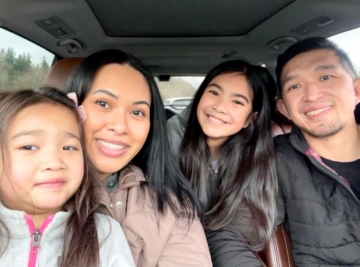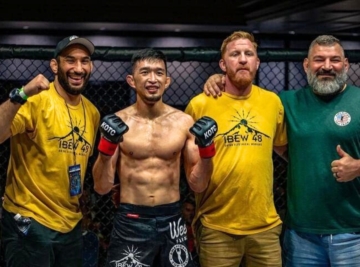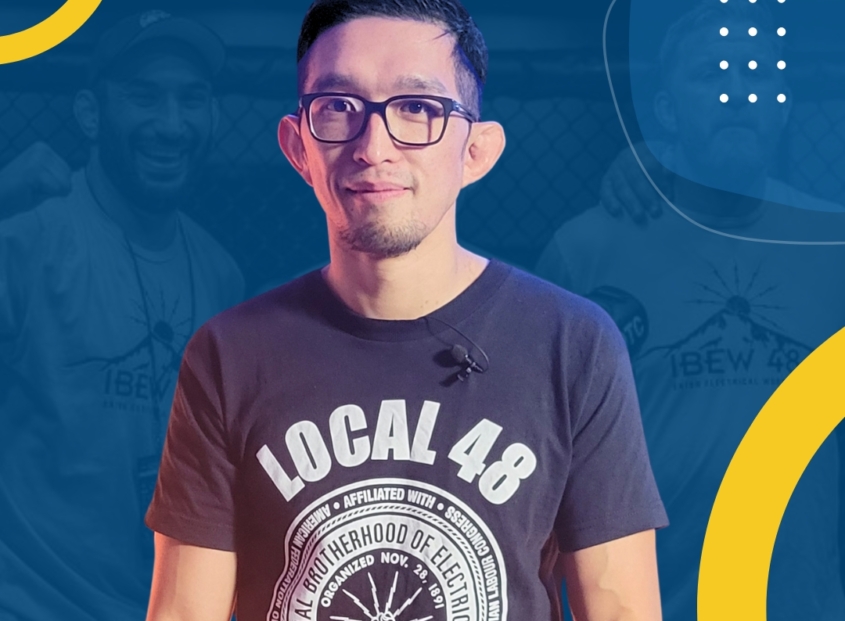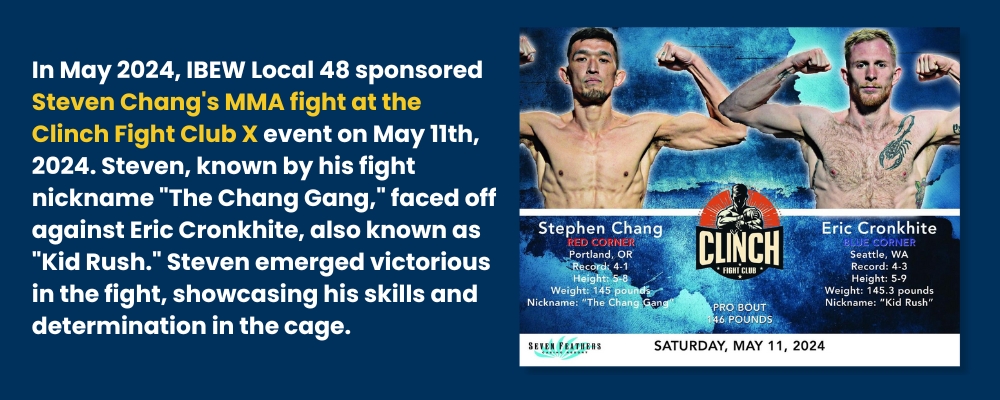Member Spotlight: Steven Chang, NIETC Apprentice & MMA Fighter
We had the chance to sit down with Steven Chang, an NIETC apprentice, MMA fighter, and passionate advocate for IBEW Local 48.
Originally from Tokyo, Steven’s journey to becoming an apprentice in the trades is as inspiring as his career in MMA. He balances the demanding life of a fighter with the responsibilities of being a dedicated husband and father to two young daughters—his oldest is 10 and in 4th grade, while his youngest is four and in daycare.
Steven’s deep commitment to the union and his belief in the power of hard work and community shine through in everything he does. To learn more about Steven’s unique journey and the impact of IBEW Local 48 on his life, read on.
How did you first get involved with the NECA-IBEW Electrical Training Center (NIETC)?
I was a professional MMA fighter and a coach, but at 39 years old, I knew my career was coming to an end. So, I started looking for something that would be both fulfilling and rewarding. My wife was the one who found the IBEW Local 48 website and showed it to me. As I started looking into it, the more I read, the more intrigued I became. It wasn’t just about the work or compensation—it was the history of the IBEW, the union, and what it meant for the American working class and the country as a whole that really drew me in. From that moment forward, I made it one of my life goals to become a union electrician.
And you’re originally from Japan?
I’m from Tokyo, specifically the Shinagawa district. I moved here when I was almost 17, in 2003. When I first arrived, I didn’t know any English. I could barely speak it—I only knew about 10 words. It was really, really difficult.
But I’m telling you, Americans are some of the nicest people, with the biggest hearts. There are so many great things I can say about this country that it would take way longer than this interview to explain. Every country has its faults, of course, but this country has given me nothing but opportunities and has accepted me with open arms.
“I’m going to be 40 later this year, and I’m still learning, still a student, still an apprentice. I want to show my daughters that with hard work, dedication, and working smart, you can change your life and go in any direction you choose.”
I also want to take a moment to mention my wife. She’s a senior analyst at Comcast now, but her story is incredible too. Her parents are refugees from Cambodia. When my wife’s mother was pregnant with her, they had to flee Cambodia, running through the mountains to the Philippines to escape the Communists. They lived through unimaginable horrors—death, starvation, and everything else you can think of. But they managed to escape just in time. They made it to Thailand, then to the Philippines, where they stayed for several months, maybe up to a year, in refugee camps until the U.S. granted them a visa. America saved their lives, and they came here to start over.
She’s been a huge inspiration to me, and she’s supported me through everything. She’s been there since my first amateur fight, helping me in ways I can’t even explain. None of this would have been possible without her. And like I mentioned earlier, she’s the one who introduced me to the IBEW.
With two wonderful daughters and a supportive and successful wife, how has your experience at home shaped the way you work with female colleagues in the trades?
The women I’ve met in this industry are amazing. They’re incredibly smart and it’s inspiring to see. A lot of times, you’ve got men twice their size, so you’d think they’d be able to get more done, lifting things, and all that. But women are just as capable—they’re smart, and they can do things just as efficiently, or even better, in many cases.
“I’ll tell you what, brotherhood and sisterhood are definitely real, and it’s amazing. I’m surrounded by some of the most inspiring, hardworking, and smart people—some of them are really competitive, too. But they’re also a lot of fun to be around, whether it’s on the job site or with my classmates. It’s fantastic. I’m so happy and fortunate to be part of this community.”
What does the IBEW Local 48 union mean to you?
I can’t stress enough what the union means, not just to me, but to working Americans and to American history. For people who are against unions, I hope they take the time to educate themselves. I try to reach out to them, especially since I have a bit of a social media following. In fact, the last few of my fights were actually sponsored by the IBEW Local 48, because I was already in the program when I took the fight.
That sponsorship opened up a lot of dialogue. People would DM me asking about the IBEW, saying, ‘Are you really in the program? Is this union thing really as good as they say, or is it as bad as others claim?’ People already have opinions, but they want to hear from someone who’s involved. I engage with them—whether their questions are positive or negative. I always answer as honestly as I can and direct them to resources where they can learn more. I believe I’ve changed a lot of people’s minds, or at least planted the seed, and I think that’s really important.
I think it’s vital for us to unite, and yeah, I’ve become an advocate for it. People don’t always understand the sacrifices made for this. People literally died for these rights—some had their homes burned down, some were killed for being union members. It’s crazy, but it’s real. And a lot of people overlook that. I wish they didn’t. I wish more people understood how important this is. For all that I know, I try to spread the word as much as I can.
Did you have a math or science background that helped prepare you for the program?
Not really, but I’ve always enjoyed working around the house and building things. Whenever we had a problem at home or needed to build something, like a new shed, I’d order a book from Amazon, look up the code, and just build it myself. It was supposed to take me two weeks, but it ended up taking the whole summer, and then some. But I was proud of it. I replaced the kitchen sink, the bathroom sink—just whatever needed fixing around the house. I really enjoyed working with my hands, even if it took longer than it should have. My wife noticed that, and she thought, ‘Why not try this professionally?’
When you first started, what was that like? Was it mostly classes, or was it a mix of classes and work?
I started working pretty much right away. We had a boot camp for the first two weeks, which involved a lot of evaluations. It taught me a lot of things I didn’t know—like the terminology, industry terms, the laws, and everything. I was really, really green at the time. But they were okay with that. They just wanted to make sure I had the right mindset—willing to learn, open to instruction, and able to follow directions. They wanted to see my aptitude and whether I was genuinely interested in the opportunity. Once I proved that, we started working right away.
What’s a typical day look like?
A typical workday for me starts at 4:55 a.m. I wake up, get ready for the day, and make sure I hydrate well. I also make sure I have some carbs to fuel myself. I have a little ritual on the way to work. I drive in complete silence, drink my hot tea, and start thinking and visualizing what I might do that day. I think about the challenges I might face and reflect on things I might have messed up the day before—thinking about how I can do better and improve myself.
Once I get to work, I focus on two main things: accuracy and quality. Speed is important too, but at this stage of my career, those first two are my top priorities. As for school, depending on the time of year, I go once a week for an 8-hour day. After work, I study for an additional 3 to 3.5 hours on the same day, and I spend 5 to 6 hours on the weekends studying more. Outside of work and school, I spend most of my time with my family or in the gym.
This sounds a lot like the routine of a professional athlete. You’re thinking about food, mental preparation—do you see what you did as an MMA fighter coming into play with this?
I’d say so. Not just as an MMA fighter, but for martial arts in general. I think a lot of skills definitely transfer over. For example, if you want to be a competitive athlete—especially an MMA fighter—hard work and dedication are a must if you want to be successful. Despite what people might think, MMA is a thinking man’s sport. You have to train your mind before you train your body. Otherwise, you really don’t stand a chance.
You also have to be open to change and new information at any given time. Things evolve, trends change—you have to be ready for new moves, new tactics. You need to be constantly studying yourself and your opponent. And most importantly, you have to be open to coaching. I think the mindset of being a lifelong student is incredibly beneficial, whether you’re in the ring or in a trade like this.
When did you get started in MMA, and how long were you in it?
I first discovered MMA after I grew up learning traditional martial arts in Japan for self-defense, starting in middle school. One day, I saw an MMA fight on TV and thought to myself, ‘This is crazy!’ I was amazed by it, and I told myself I wanted to have at least one amateur fight before I die.
“In MMA, you need a support team around you to get better. You can’t do it all on your own. You need to learn from others, and you need people supporting you—like coaches, managers, and of course, fans.”
Years later, I came to America, and I’m so grateful to be here, but at first, I didn’t have the financial means to train. So, I had to wait until around 2012 before I could start training again. A couple of years after that, I finally decided to cross off that bucket list item and had my first amateur MMA fight. I ended up winning, and my young, naive self thought, ‘Maybe I’m good at this!’ So, I kept training and kept fighting.
One thing led to another. I won a couple of amateur championships, got some sponsors, and then I was discovered by a management team. They helped me get licensed, and I eventually turned pro.
Are you still competing in MMA?
Long story short, I might have one more fight. My older daughter has seen me fight, but only online or on TV after the fact. I never let her watch me fight live because I feel like taking my family to a fight is too stressful for them—and for me, too.
But my daughter started wrestling about two years ago, and she really enjoys it. Recently, she asked me, ‘Hey, dad, can you compete one more time, at least live, for me?’ So, I’m still training every day. I’m still coaching both kids and adults. I actually volunteer once a week to coach kids, and I get paid to coach adults, including professional and amateur fighters.
I’m still training hard, and I know I’m in good shape. I’m thinking about doing one more fight for my daughter, but that’s really it.
What’s volunteering with kids been like?
There’s a program at my gym, American Top Team in Portland, and they offer kids’ classes every day, Monday through Saturday. They need coaches, and while the program itself isn’t free, since the gym needs to make money, I dedicate my time for free. I don’t feel comfortable accepting money for helping kids.
Martial arts really saved my life and gave me the confidence I needed to keep going. I didn’t have the best childhood either. I grew up with a lot of challenges—poverty and other struggles. It wasn’t the worst, but it wasn’t easy. I see some of these kids in class who might be going through similar things. Maybe they lack role models, maybe they’re bullied, or maybe they’re smaller than the other kids. When I work with them, I can see them growing—not just in skills, but as people. They’re becoming stronger versions of themselves, and I can glimpse a bright future for them.
What advice would you give someone who’s considering entering this trade?
Of course, studying math and other subjects is important, but I think it ultimately comes down to mindset. You need to reprioritize your life in a way that works best for you and become a master of time management.
I know that being in this trade and being an apprentice can be time-consuming—it’s a lot to take on. But I believe dedication and impulse control are key. You can make time by cutting out things that aren’t necessary or important.
My first piece of advice is that, and secondly, I would say—more than anything—learn to love learning. Grow a true passion for learning, and develop a passion for the trade. If you do that, you’re going to be fine.
About Steven Chang
You can explore more of Steven’s MMA history on his Instagram page. There, you’ll find past fight highlights, career milestones, and a look back at his journey in the sport.




